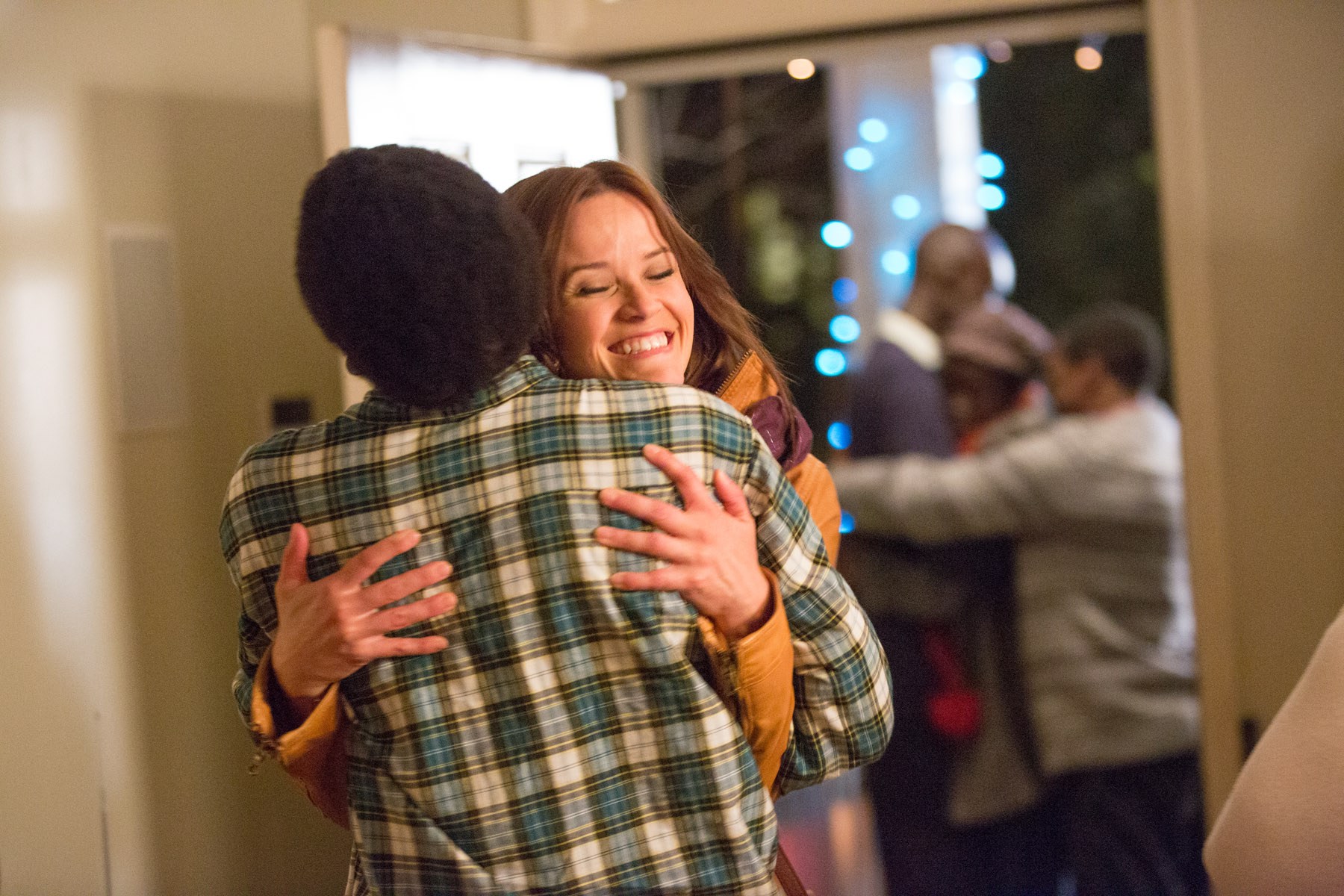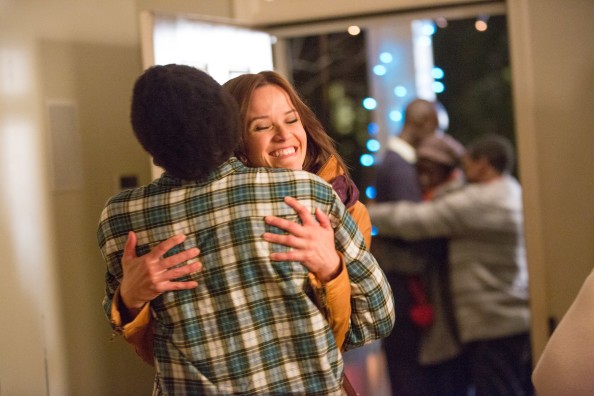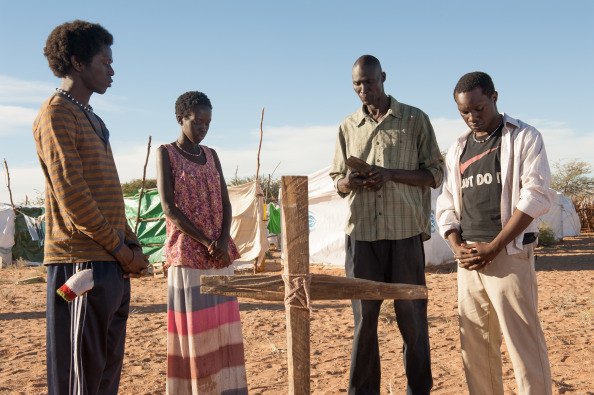They were known simply as “The Lost Boys.” Orphaned by the brutal Civil war in Sudan that began in 1983, these young victims traveled as many as a thousand miles on foot in search of safety. Fifteen years later, a humanitarian effort would bring 3600 lost boys and girls to America. In “The Good Lie,” Philippe Falardeau, (writer and director of the Oscar(R)- nominated Foreign Language film “Monsieur Lazhar”) brings the story of their survival and triumph to life. Sudanese actors Arnold Oceng, Ger Duany, Emmanuel Jal, and newcomer Nyakuoth Weil, many of whom were also children of war, star alongside Academy Award(R) winner Reese Witherspoon and Corey Stoll. — (C) Warner Bros.
The Good Lie, expanding this weekend into more theaters, focuses on the Lost Boys of Sudan migrating to America seeking a better life. The buzz started early September at the Toronto Film Festival with a rapturous standing ovation. And The Good Lie is quite the crowd pleaser. It earned a very rare A+ CinemaScore rating from audiences during its limited release. Audiences seeking an inspiring escape from a cruel world will have a lot to admire with the determination and perseverance in The Good Lie. Actors Emmanuel Jal and Ger Duany are Sundanese actors who were part of the Lost Boys also migrated to the United States. I had a chance to sit down and talk about the good lie with actors Emmanuel Jal and Ger Duany as well as The Blind Side producer Molly Smith.
The idea behind to produce the movie based on The Good Lie was over a decade in the making when the late producer Bobby Newmyer met some lost boys living in the US for another movie he was working on.
“He became really passionate about their story, but when he died it ended up through a lot of hands.” said producer Molly Smith reflecting on the late producer.
“I got it about two and a half years ago with my partners,” she continued. “I left my producing gig at Alcon and decided I wanted to do more independent films. I went out and raised a film fund with two partners. We started Black Label Media and we didn’t have an office yet.”
Producer Molly Smith (The Blind Side, Begin Again) has first-hand experience knowing and caring for the Lost Boys of Sudan. Her family met some of the lost boys in 2001 and her family adapted one of them. It is this personal experience that motivated her to work on The Good Lie.
“The script had this long journey and it was fated to come our way. I was really determined to help bring this story to the big screen,” she said.
Casting actors who were in similar situation seemed vital to convey the authenticity The Good Lie. The filmmakers wanted to portray realism to the audience. Actor Emmanuel Jal wanted actual Lost Boys to relate to the re-telling of their familiar story.
“It is a very delicate story and when you’re telling a story like this every Lost Boy can say, ‘that is my story!?’ Now that the whole thing is coming out, the real Lost Boys are amazed by the movie,” said Emmanuel Jal.
Likewise, actor Ger Duany appreciated how real the screenplay to The Good Lie was and its ability to captivate him.
“When I got the script, I got it from a friend who is Sudanese who lives in New York,” said Ger Duany. “And then I read it. The script just grips you. I was one of the kids that left the country and find safety. We went through all of that. When I came across the script I couldn’t believe how vivid it was and it was real.”
As a producer, Molly Smith reflected on the challenges and hardships of bringing The Good Lie to the big screen. They visited real refugee camps and were able to spend a day in there. It was a surreal experience for the. They also filmed in South Africa and didn’t have the budget for thousands of Sudanese extras.
Molly declared that the best thing about the production of The Good Lie was the multicultural aspects of everyone on set coming together to tell an important story.
“It was like this family that came together, it was the biggest melting pot of cultures,” Molly said. “Our director and DP and a lot of his crew were French Canadian speaking French on the set. Another interesting layer mixed with the Sudanese. And people like Reese [Witherspoon] and I our Southern girls shooting in Atlanta and end up in Africa with our New York producer normally decked out in her Prada shoes. It was this great melting pot of people that came together totally out of love for telling this story.”
It took a long process to find the actors they needed. Some of the filmmakers along with Molly traveled around the country to churches speaking to people about wanting to make The Good Lie. When they found the actors, Molly wanted both Emmanuel Jal and Ger Duany to convey the themes of the story.
“The pressure of these two re-telling their story and there was a large community in Atlanta where we were shooting. One of the challenges was in the casting process and putting the word out about the casting. We went on a lot of road trips to find people,” she said.
Both Emmanuel Jal and Ger Duany wanted audiences to know while watching The Good Lie that the conflict is still on going and unsettled. It isn’t just a movie on the big screen, but an experience many people are living without the ability to tell their perspectives. Consider The Good Lie a way to tell the world about their story.
“We can sit here and talk about The Good Lie It is a story about the kids who escaped and how they survived by their strength,” Emmanuel Jal said. “I think they over exceed anyone’s strength. And that’s what makes this movie very special to all of us. The refugee camps are still there and that’s why The Good Lie is important to inform the world that what we can do as a people.”
The Good Lie is playing in theaters and expands wider this Friday.








